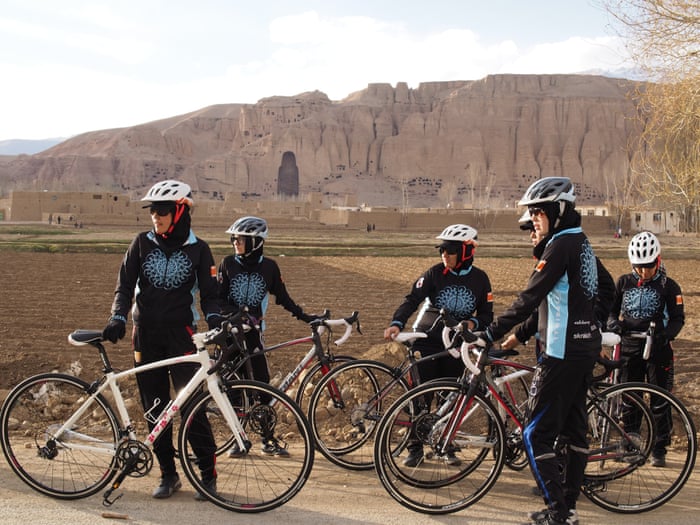She deliberately tries to conceal her gender identity whenever she happens to do shopping in cycling clothing and helmet. Riding bicycle is an easy sport for the 23-year-old Nargis Hakimi but some Afghan men often open mouth to tease her when they find out her on bicycle seat. To avoid falling in trouble with misogynist men, Nargis disguise herself in men clothing when she goes out for a business on bicycle.
A deeply conservative and tribal nation, Afghanistan is risky country for those women who are struggling to develop their own identities. Many traditional Afghan families treat women as second sex. In urban areas of the country, a number of young women, however, are struggling to change this century-old anti-women bias.

When nine, Nargis Hakimi broke the ice and rode bicycle. By then she was with her parents in Mashhad, Iran. Love and passion pushed her to continue bicycling and earn a membership in Afghan Cycling Federation.
In 2016, she came to Kabul to become a national cyclist and contest in international cycling races. In Kabul, Nargis soon realized that things were not as she expected. “Once on our way to Bagrami, a man hit me with half a brick on my shoulder, which left lifelong scare on my shoulder,” says Nargis.
Later, she got married, knowing well that marriage life would bring many restriction for a young cyclist who dreamed to be the best in her career. “My in-laws are very traditional and religious-minded. After I married Hafiz, my husband, my in-laws told me that it’s a shame for their family to allow me ride bicycle in public,” Nargis says.
Despite pressures by the society and family, she is struggling to pursue her dream. By wearing men cloth, she disguises her identity as man. She does home chores, raises up a child and rides bicycle in a hope that the country might be a better place for next generation of female cyclists.
Rokhsar Habibzai, 22, is a cyclist who rode bicycle when she was in nine grade. It was not an easy task for her. Many men would make her a subject of mockery when she would take her cycle out to master cycling on the streets of the neighborhood where her family was living. “The men in our neighborhood were ridiculing me—saying that girls are not meant to ride bicycle. It’s a shame for us to let our women ride bicycle, it’s against our pride and honor,” says Rokhsar.

For Rokhsar things changed slightly later on when her family moved from a conservative area of Chahar Rahi Qambar to Kart-e-Char, a relatively well-off and less-conservative neighborhood in west Kabul.
She is also member of Afghan Cycling Federation. But her older brothers still feel uncomfortable to see her sister ride bicycle. Ms. Rokhsar is prepared to fight against all obstacles including her brothers’ divergence.
Afsana Nawruzi, 18, is an enthusiastic bicycle rider, who for the very first time rode bicycle when she was 14 years old. Ms. Nawruzi has similar experiences as Rokhsar and Nargis have of cycling in Afghanistan. By wearing man cloth, she would disguise her gender identity as a boy in her home town Ghazni. “To pursue my dream, I got my hair cut short and dressed me up in men cloths. Many times I was threatened to death but never gave up,” says Afsana.
Her account of riding bicycle in public is a painful story which tells us to what extent the Afghan society can become misogynist and violent against female population. Despite pressure, she has not missed a single opportunity to attend national and international events.
The young women cyclists are committed to stand for their rights and fight for it.
“In their eyes, we are bad women because we practice in public,” says Rokhsar.

Afsana, Nargis, and Rokhsar are members of Afghan Women’s National Cycling Team. In 2016, the team’s members Masoma and Zahra Alizada won second and third positions in cycling competitions in Albi, France. Following this achievement, 118 members of the Italian Parliament nominated the team for the 2016 Nobel Peace Prize. The award however went to Juan Manuel Santos, president of the Republic of Colombia in South America, for his efforts to end the conflict with the FARC rebels and bring peace to the country.
Ever since 2016, the Afghan National Cycling Federation has not been able to contest in international race. These three young members of the team are working hard to contest in coming international matches.




